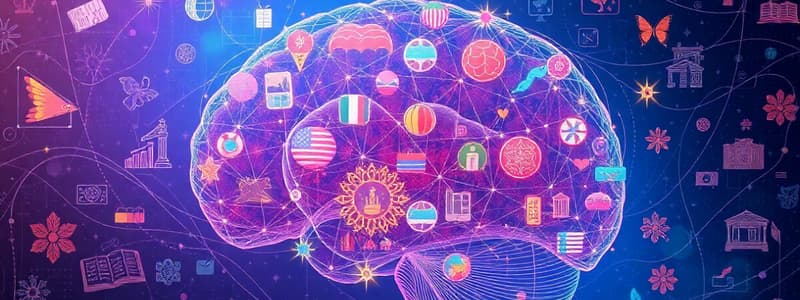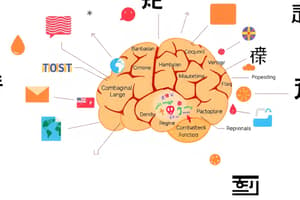Podcast
Questions and Answers
What is a common misconception about the multilingual brain?
What is a common misconception about the multilingual brain?
- There is a limit to how many languages a person can learn. (correct)
- Switching languages is easy for the brain and has no challenges.
- All languages are processed in completely different brain regions. (correct)
- Multilingual individuals experience no cognitive benefits.
How does the brain adapt when a person learns a new language?
How does the brain adapt when a person learns a new language?
- The language areas in the brain grow to accommodate new languages. (correct)
- The brain prioritizes the new language over the native language.
- The brain completely shuts down the use of the native language.
- New languages are stored in regions that handle other types of information.
What role do cognates play for multilingual speakers?
What role do cognates play for multilingual speakers?
- They only exist in European languages.
- They create confusion when switching languages.
- They are helpful in understanding new words or grammar rules. (correct)
- They are words that are completely different across languages.
What is one benefit of being multilingual mentioned in the content?
What is one benefit of being multilingual mentioned in the content?
Which of the following is NOT mentioned as a challenge of switching languages?
Which of the following is NOT mentioned as a challenge of switching languages?
What happens to the dominant language when a new language is learned?
What happens to the dominant language when a new language is learned?
Why is the brain considered powerful despite its small weight?
Why is the brain considered powerful despite its small weight?
What is one way that multilingual individuals might experience flexibility in language use?
What is one way that multilingual individuals might experience flexibility in language use?
How does speaking multiple languages benefit individuals learning English?
How does speaking multiple languages benefit individuals learning English?
What connection does a person's native language have with their culture?
What connection does a person's native language have with their culture?
Study Notes
Connection Between Brain and Language
- The human brain weighs approximately three pounds, only slightly heavier than a pineapple.
- Responsible for processing, speaking, hearing, and understanding language.
- Being multilingual leads to notable changes in brain structure and function.
Language Processing in the Brain
- Initially believed that separate brain areas were responsible for each language; this has been disproven.
- There is no limit to the number of languages a person can learn; all languages share the same brain regions.
- The brain adapts by expanding language-related areas to accommodate new languages.
- Multilingual individuals may experience competition between languages, with the native language often being more dominant initially.
Language Switching: Benefits and Challenges
- Speaking multiple languages connects individuals to diverse communities and cultures.
- Native language fosters familial and cultural ties, while the community's language enhances social connections.
- Multilingualism can aid English learners by allowing them to leverage their native language for understanding new concepts (e.g., cognates).
- Example of cognates: "bicycle" in English corresponds to "bicileta" in Spanish and Portuguese, "bisikleta" in Tagalog, and "bisiklet" in Haitian Creole.
- Frequent language switching can lead to difficulties in using one language exclusively, causing frustration for some individuals.
- Personal anecdote: Andres Ortega Cruz experiences challenges in using only one language due to habitual switching between Spanish and English.
- The multilingual brain is characterized by greater flexibility and the ability to manage multiple languages seamlessly.
Studying That Suits You
Use AI to generate personalized quizzes and flashcards to suit your learning preferences.
Description
This quiz explores the intricate relationship between the brain and language processing. Learn how multilingualism affects brain structure and functions, and the benefits and challenges of language switching. Understand the adaptive nature of the brain in accommodating various languages.




